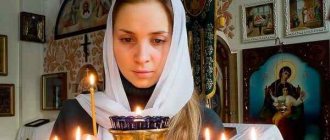Prayer - what is it?
According to the teaching of the Holy Fathers, “prayer is communication and conversation between a person and God . Or as they also say about it: “Prayer is communication and unity of a person with God.” It would be more correct to say that in prayer a person speaks, or at least tries to speak, with the Lord.
As we know, in order for a child to learn speech, usually no one specifically teaches him this. But he acquires this gift in communication with other people, primarily with his parents - this was exactly what happened before with the gift of prayer.
Which the child learned in communication with other, more experienced prayer books; studied mainly in his pious family and Christian society. However, now “you have to look for it during the day.” That is why one of the main problems of a modern Christian who has come from atheism to Orthodoxy is that he simply does not know how to pray.
Useful materials
How about this, long before our times, there was a revelation in the form of a vision (they say it was to the holy righteous John of Kronstadt):
“I look - a lot of people are walking, terribly exhausted, everyone has a star on their forehead. When they saw us, they growled: “Pray for us, holy fathers, to God, it’s very difficult for us, but we ourselves don’t know how. Our fathers and mothers did not teach us the law of God, and we don’t even have a Christian name.”
Who can help us in this terrible trouble?! Only the Lord Himself. And in order to receive such help, first of all, let us note that prayer is only part of our conversation with God, when we talk to Him. The second part of it is reading the Holy Scriptures, when God Himself speaks to us.
Interesting fact
There are three types of prayer: petitionary (when we ask God for something), doxology (glorifying God as the Creator of the universe), and thanksgiving (when we thank God for His mercies). The highest, most perfect form that every Christian should strive for is, of course, thanksgiving.
How to Pray
Having opened the Gospel, we learn the commandments of Christ about prayer, given by Him in the Sermon on the Mount:
“When you pray, do not be like the hypocrites, who love to stand and pray in the synagogues and on street corners, so that they may appear before people. Truly I tell you that they are already receiving their reward. But you, when you pray, go into your room and, having shut your door, pray to your Father who is in secret; and your Father, who sees in secret, will reward you openly” (Matthew 6: 5-6).
True, the literal meaning of this commandment seems vain to us. And indeed, living in an anti-Christian society, we are unlikely to become famous if we pray ostentatiously in various public places and at crossroads. We're more likely to be mistaken for crazy people. So in our time, few people dare to repeat this dubious “feat” of the ancient hypocrites.
But this commandment has another, spiritual meaning. After all, in any society and place there is always at least one attentive spectator, often for whose sake we perform various good deeds, including praying. Who is this viewer? It's yourself. For our fallen nature tends to remember our good deeds, to be proud and arrogant about them.
This is especially characteristic of those “ascetics” who, having not learned to pray at all, try to perform special prayers, most often to “Jesus.” They usually scrupulously count, remember their number and fight with might and main for it. But... according to the above commandment of the Savior, this is futile work.
The following rule is true here: “What we remember, God forgets; and what we forget, He remembers.” We remember our virtues, but the Lord forgets them; and if we forget them, He will remember. For our fallen nature, the first is characteristic (to see ourselves as very virtuous), and the last is very difficult. But it is necessary, otherwise the prayer will not work. I’ll also tell you how to achieve this last thing - for this you need to have a firm Orthodox faith in the dogma of the Redemption. This is the only way a Christian can learn not to remember the good deeds he has done - otherwise there is no other way!
What does the Savior say further about prayer:
“And when you pray, do not say too much, like the pagans, for they think that for their many words they will be heard; Do not be like them, for your Father knows what you need before you ask Him” (Matthew 6:7-8).
According to the interpretation of this passage of Holy Scripture by Blessed Theophylact:
“Much verbosity is idle talk: for example, begging for something earthly - for power, wealth, victory. Polyphony is also inarticulate speech, like the speech of children. So, don't be an empty talker. One should not make long prayers, but short ones, but continually remain in short prayer.”
The pagans, “having known God, did not glorify Him as God, and did not give thanks, but became futile in their speculations, and their foolish hearts were darkened; calling themselves wise, they became fools, and changed the glory of the incorruptible God into an image made like corruptible man, and birds, and four-footed creatures, and creeping things” (Rom. 1: 21-23).
Therefore, they invented for themselves many “gods”, each of whom was responsible for something earthly: this same power, wealth, victory, etc. Therefore, fearing to offend any of these “gods” of theirs, they tried to please everyone in prayer. That's why they were verbose.
Just as, for example, pagan Athens was so filled with idols (they also tried to please every “god”) that the Apostle Paul, while staying in this city, was even “troubled in spirit” (Acts 17: 16). So little of this, fearing that even with all their zeal they had forgotten some idol, the prudent Athenians also specially created an altar “to the unknown God” (cf. Acts 17: 23) - this is for those whom they did not honor with a temple! This is what St. Paul took advantage of for his sermon in the Areopagus.
For us, the following is important in all this: the pagans distorted the image of God, because of which they could not pray in such a way as to be heard by God. And indeed, even in our ordinary conversations we speak differently with different persons: differently with our mother, differently with our father; otherwise with the master, otherwise with the slave; otherwise with a friend, otherwise with an enemy, etc. After all, a lot depends on the face of the interlocutor, and if we start talking to him out of rank, then no conversation will work. It’s the same in prayer—conversation with God.
But although the pagans distorted the image of God, they still believed that there was a God or gods. And someone who comes from atheism must learn this too. Until he has mastered this, his prayer comes up with some kind of empty space. Which, by the way, very conveniently flows into the previous one - when such a hypocritical “prayer book”, not seeing God, prays for show in front of himself.
If a Christian overcomes this temptation, then he needs to understand the properties of God. For now demons, as well as some false teachers, are trying to portray God as either only merciful and forgiving; or only the righteous and punishing for everything. In the first case, according to their false teaching, “there is no need to pray,” for the Lord “will forgive everything anyway.” And in the second - “there is no point in prayer,” for the Righteous Judge “still will not have mercy.”
Christians of this evil age willingly fall for this demonic bait because of their excessive sinfulness. We are afraid to present our monstrous sins to the judgment of God, so we often expect only mercy from Him. When, naturally, we don’t receive it alone, then we fall into despondency or, even worse, into despair. And then we no longer pray, thinking that there is no mercy.
The following is correct here.
No matter how terrible our sins are, we should confess them to the Lord in confession and prayer. For God is righteous and sees everything: as a certain blessed elder said: “Neither He will deceive you, nor you will deceive Him.”
But at the same time, one must have firm faith in the mercy of the Redeemer, which, according to the saints, is an ocean of mercy in which, like a drop of vinegar, all our sins, no matter how monstrous they may be, dissolve and disappear without a trace.
But this does not happen on its own, not by virtue of God’s mercy alone, but only when we make an effort to this in confession and/or in prayer. For
“From the days of John the Baptist until now, the kingdom of heaven suffers violence, and those who use force take it” (Matthew 11:12).
If a Christian does this, he will begin to truly pray. He will feel like a man who is drowning in the swamp of his own sins or hanging over the abyss of his iniquities, and calls for help in the hope that someone will hear him. This call is a semblance of prayer. Therefore, just as the perishing person who thinks to be saved by his own cry, a call for help, will seem to us insane, so is the above-mentioned hypocrite who thinks to be saved only by numerous repetitions of prayers to be saved.
No, it is necessary that someone hears the dying person and comes to his aid: helps him get out of the abyss, pulls him out of the swamp: this is similar to the first type of prayer - petitionary, when we ask the Lord for something. And if such a helper is not always found in the world, then in spiritual life the Savior always remains next to us and waits for us to prayerfully call on Him.
From the Heart
“Prayer is the most powerful form of energy emitted by a person. When we pray, we connect ourselves with the inexhaustible life force that moves the entire Universe. We pray that at least some of this power will come to us. By turning to God in sincere prayer, we improve and heal our soul and body.” Doctor and Nobel Prize laureate in physiology and medicine Alexis Carrel
Numerous facts about the positive effect of prayer on the life expectancy of cancer patients prompted a group of scientists from the St. Petersburg Psychoneurological Research Institute. V.M. Bekhterev to conduct a study of the neurophysiological mechanisms of the influence of prayer on the functioning of the brain. Under the leadership of Doctor of Medical Sciences V.B. Slezin discovered a fourth state of the brain (besides the well-known three: wakefulness, rapid and slow sleep) - prayerful wakefulness (slow wakefulness), which is characterized by a complete shutdown of the electrical activity of the cerebral cortex with full consciousness. A person in this state perceives information without affecting thought processes.
During prayer, a person's oxygen consumption decreases by about 20%, while during sleep - by only 8%. It turns out that prayer leads to better restoration and normalization of the functioning of the body than even sleep. Researchers argue that the presence of prayer vigilance in a person’s life is as necessary as all other states of the brain. The complete and prolonged absence of this condition contributes to the disruption of the harmonious development of a person, and thereby the emergence of various diseases and degradation. The state of prayerful wakefulness is possessed not only by people who read prayers, but also by those practicing spiritual practices, as well as by infants up to two or three months old. According to studies, Orthodox prayers (and especially the Lord’s Prayer) have significant advantages over the prayers of other faiths and various spiritual practices - their use has a more healing effect on the physical and spiritual state of the person praying. The beneficial effects of prayer are as follows:
- Prayer, better than sleep, restores the body , improves metabolic processes, strengthens the immune system and normalizes blood pressure - the body seems to be renewed. A few minutes of reciting a prayer lowers cholesterol and blood sugar levels and lowers blood pressure. According to statistics, among patients with cancer in an inoperable stage, believers live on average 5 years longer than atheists, and science knows the facts of the recovery of such people through prayers;
- prayer improves the psychological state , relieving a person of worries and worries, disconnecting his consciousness from traumatic situations - believers are less prone to depression compared to non-believers. It is recommended to pray for those and for those who at times fall into deep depression or suffer from manic-depressive psychosis;
- prayers improve brain performance , which minimizes its pathological age-related changes. Reading prayers daily reduces the likelihood of developing Alzheimer's disease by 50% and significantly improves memory (research by the National Institute of Mental Health in the USA);
- As a result of prayer practice, synchronization of the cerebral hemispheres - within 2-4 months the “lagging” hemisphere catches up and reaches the level of the dominant one. Thus, a person gradually develops tendencies towards imaginative (intuitive) and logical (analytical) thinking, which makes him more intellectually healthy, energetic, protected from stress and able to show talent and intuition;
- prayers develop abstract thinking;
- prayers help a person maintain physical and spiritual balance;
- Through prayer, a person begins to look at the world differently, more correctly assessing his life and the difficult situations in it. Scientists have come to the conclusion that the need for prayer is inherent in the human consciousness initially and is a kind of protective function of the body. After all, even non-believers in especially difficult life situations turn to God with prayer;
- two to three months of prayer practice significantly increases a person’s biofield , changing its color towards light colors and eliminating disturbances in it;
- prayers cleanse and harmonize the aura home, water, food and various items.
By drawing negative life situations in his imagination, living through grievances and fears again and again, a person himself contributes to the emergence of his illnesses and troubles - thoughts are material. But by saying a prayer with pure thoughts, a person renounces the negative perception of the world around him and subsequently begins to see the surrounding reality differently. He becomes purer, kinder and stronger spiritually, attracting positive events into his life.
The article uses materials from the scientific publication of V.B. Slezina, N.I. Muzalevskaya, V.M. Uritsky and I.Ya. Rybina “Changes in the functional state of the brain during Christian prayer” V.B. Slezin, N.I. Muzalevskaya, V.M. Uritsky, I.Ya. Rybin and the book by E. Newberg and Yu. D'Aquili "Why God Never Disappears?"
Author: Lisetskaya I.A. 03/03/2017, 22:51.
See also:
Christian healing remedies How to pray correctly or Rules for turning to God Orthodox prayers and their interpretation











